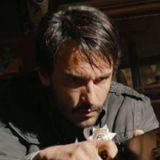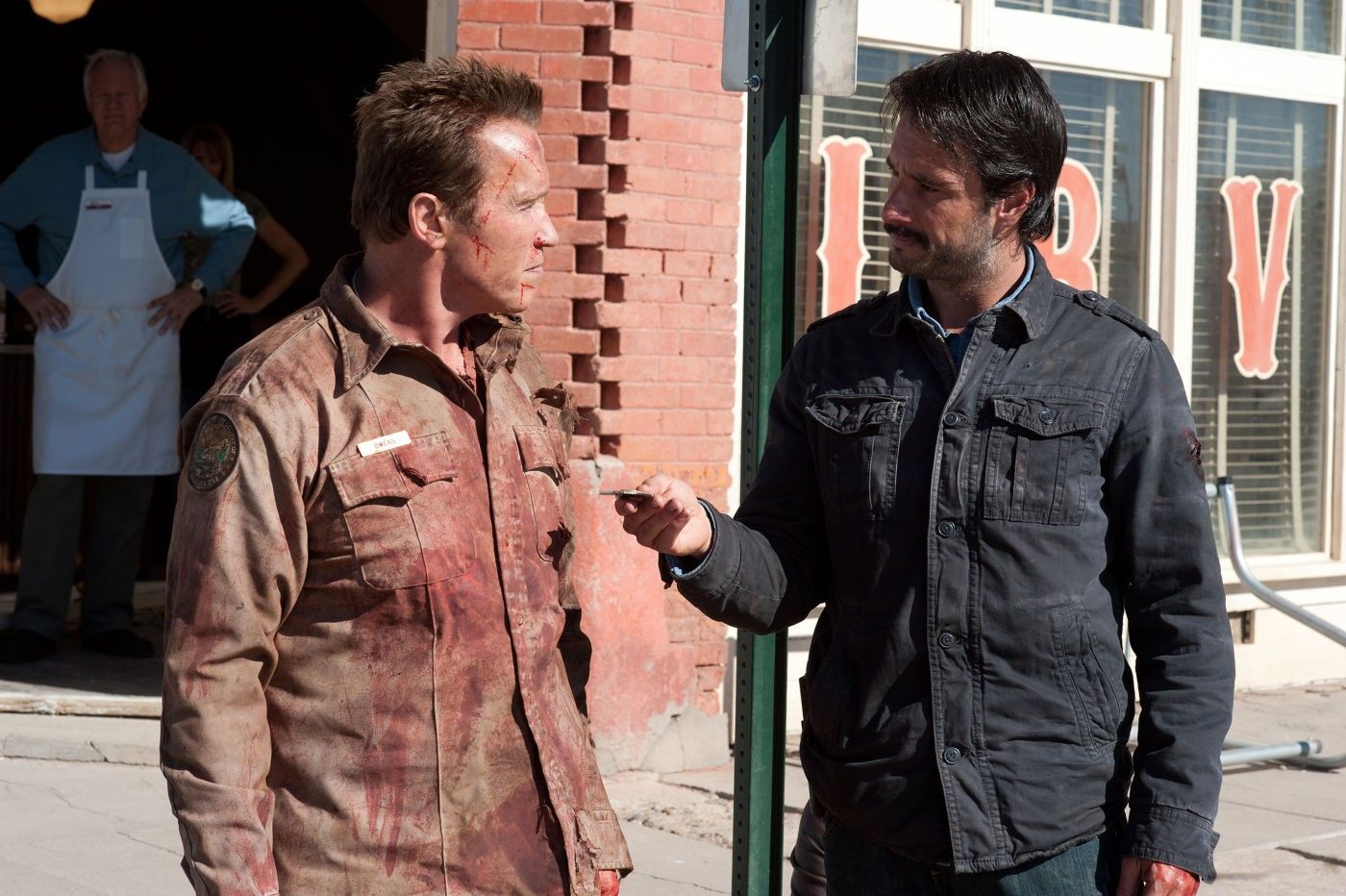Although Kim Ji-woon's The Last Stand is earning plenty of buzz as Arnold Schwarzenegger's return to a leading role, the film wouldn't be quite what it is without its supporting cast: There's Johnny Knoxville, Luis Guzman, Jaimie Alexander, Zach Gilford and Rodrigo Santoro, all of whom get enough time in the spotlight to make an impact.
Spinoff Online spoke with Santoro ahead of The Last Stand's Jan. 18 release, and while talk inevitably turned to 300: Rise of an Empire, we also chatted with the actor about his experience in his first real action film. Unsurprisingly, he said it was exciting to graduate from Xerxes to a character who actually gets to fight his enemies.
Spinoff Online: What was the pitch you were given when you first heard about The Last Stand?
Rodrigo Santoro: My manager said they were putting together a film with Arnold. It's going to be his comeback in a leading role. First of all, it was already, "He's back! He said it! He said it!" You know? He's honest, I love it! And it's an action film, and it's going to be directed by this critically acclaimed South Korean director. And I'm like, “Interesting combination, I love that. OK, let me take a look at it.” That was the very first approach.
How long until you signed on?
When I met the director. Right there. We had a great long, long meeting, like, I don't know, 45 [minutes] to an hour, and we were talking about everything, not only about the movie. We started talking a little bit about the movie, and then we went everywhere -- and he didn't speak very much English at that time. We had a translator, and I was like, well, I've never had this situation before, but he's such an interesting artist and he knows how to express. He will just pantomime, like mimic, whatever and he just makes you understand, like body language and everything.
We talked about theater. We sort of started in the same way that he started with theater and I did too in Brazil. We started talking about all that and I'm like, I just want to work with this guy. It was a no-brainer.
It was Arnold and director Kim. Those two elements were the first thing that I heard, and then I read the script. They kept kind of like working on the script and changing it. Even my character got a lot of changes from the beginning. They were trying to make this guy who was more like a troubled guy and a little bit lost in life and trying to get a backstory that, at the end of the day, you can't have so many parallel stories. You have to follow the main thing. But at first we had much more of a backstory.
You can see a tease of that too at the beginning when he's in the jail cell.
Yes, exactly. There was a scene before that explaining that's unfortunately not there. You've got to make choices at the end of it, along with a lot of other scenes that are not there. That's movie editing anyways; you've got to make choices.
Was there anything that was cut beyond that one that you wish was still in there?
No, I think it was that one. That one was the main one that kind of like explained his backstory a little bit, but still, the idea for this character was he's a former veteran that kind of like is this troubled guy that has always made bad choices in life, and he's having a hard time to readjust. And when Owens offers him the opportunity to sort of like redeem himself, we wanted to take the character from one place to the other. That was the idea, and I like that. So you have a journey. Yeah, it was fun.
And then you finally get to get in on the action, too.
There you go.
I was worried at the beginning that you wouldn't get a chance to!
Exactly, because in 300 I don't. I'm the "god-king" so I'm up there in my throne with my cape and my gold. I was craving. This is the first time.
That's right, this is your first action film. How was it for you having never done it before?
It's a combination of feeling like a kid -- you're really playing, you're really having a blast -- with the responsibility where there's this voice that says, "Hey, you're shooting a movie. We're working here." You are working here, but it feels like you're not.
It doesn't help that you're working with Johnny Knoxville and Luis Guzman.
Oh, my God. We were, like, right before shooting and I was with Luis the whole time and he was just firing jokes and I was like, "Dude, let me focus!" He's just talking all these absurd things and I'm like, "Shut up! Shut up!" "Action!" And many times we would laugh or whatever, but it made the experience so pleasant. It was so much fun, those two.
[Guzman] improvs so much. Luis is great doing it. We had a lot where we were just improvising it, and the director liked it. He wanted to leave it open to the actors also to collaborate. Johnny, too. I don't even have to say anything about Johnny, how funny he is and all those things, but I really, really had fun. And doing some of my stunts like driving the bus, the guy lands on the roof and I kind of had to drive with one hand --
Did you actually get to drive the bus?
I did! I did a test beforehand. They got the crew together and were like, "OK, we have an announcement to make. Now we're going to have the actor to [drive]." Of course, I didn't do the spinning. Anyways, I did. I got to drive, I got to do the scene for real, the shooting. Just the running -- we had a lot of running. I shot a lot of running from the bus. When I run I go up to try to save [Jaimie Alexander], there was even much more. [The shootout scene in the hallway], that was creepy. That was the most difficult one to do.
Really? Why?
Because it was just close and loud and really it felt real. It felt so real and the guy was right there, but it was such an adrenaline rush, that one. We had amazing stunts and the coordinator was great. I felt very safe. Very much like I'm having fun here but with responsibility.


